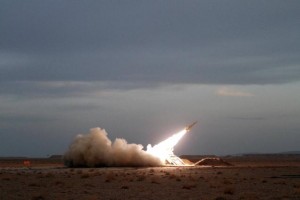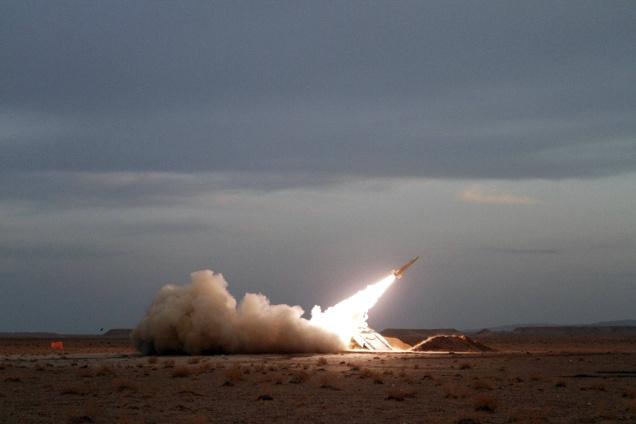
TEHRAN � Above the bustling Niayesh highway in the western part of the Iranian capital, a huge billboard hangs on an overpass to remind drivers of�Iran�s missile abilities. Cars zip underneath the image of a green missile on a launcher and text in Persian saying �Destination Tel Aviv.�
Few here take note of the sign, as average Iranians are too busy trying to cope with rising prices and occasional shortages brought about by a faltering economy. But Iran�s missiles and weapons technology are getting plenty of attention hundreds of miles away in Gaza, giving the country�s ruling clerics a rare bit of good news in what has otherwise been a long, dismal year.
The Israeli attack on the�Palestinian�coastal strip, and the retaliation by�Hamas�with Iranian-supplied missiles that brought Israel�s major cities within range for the first time, turned the tables for the Islamic republic. With the declaration of a cease-fire in Gaza, and with President Mohamed Morsi of Egypt earning plaudits for brokering the deal, some of the euphoria in Tehran has been tempered. But the diplomatic gains to Iran from the fighting will remain.
Before Gaza, Iran was reeling from a number of setbacks, and not just the tightening of Western sanctions this summer, which cut oil exports and sent the national currency into free fall.
The clerics had to endure the indignity of Mr. Morsi,speaking at a conference in Tehran, smashing their long cherished dreams of a strategic partnership by criticizing Iran�s support for its lone regional ally, Syria, in its brutal prosecution of its civil wear.
Even Hamas, Iran�s longtime ideological partner,�openly turned its back on Tehran and Damascus�and sided with the alliance of Sunni Muslim kingdoms against the Syrian government. Newer and more dynamic countries, like Qatar and Egypt, emerged to take the lead on issues in Syria and Gaza, making Iran�s uncompromising message of resistance look stale.
Then, a week ago, when Israel struck back against the rockets and missiles coming from Gaza, all the regional players were roughly pushed back into their traditional roles, beginning with Mr. Morsi, who led the effort to broker a cease-fire just as the country had done when Hosni Mubarak was president. Sheik Hamad bin Khalifa al-Thani, the emir of Qatar, who in October had�paid an unprecedented visit to the Gaza Strip, presenting himself as Hamas�s new benefactor, waited four days before giving a statement on the fighting between Israel and the Palestinians.
Throughout the battle, Iranian-designed missiles, the Fajr-3 and the Fajr-5 that allowed Hamas and another Gaza-based movement, Islamic Jihad, to hit Israel�s heartland, sent Israelis fleeing to bomb shelters. While political support and money helps, Palestinian leaders said, Iran�s weapons technology is a far greater help.
�The arms of the resistance, including those of Hamas, are Iranian, from the bullet to the missile,� Ziad al-Nakhla, deputy leader of the Islamic Jihad, told the Lebanese Al Manar TV in Cairo on Tuesday. �If it wasn�t for these arms, the Israeli Army�s weapons would have run over the bodies of our children,� he added, lauding the �great sacrifices� Iran had made by �shipping� these weapons to Gaza.
Iranian officials have not been shy about taking credit for the changes in the battlefield, even though analysts noted that admitting to transferring weaponry could lead to future reprisals. �We proudly say we support the Palestinians, military and financially,� the head of Iran�s Parliament,�Ali Larijani, told local reporters this week. �The Zionist regime needs to realize that Palestinian military power comes from Iranian military power.�
Mr. Larijani even nodded to the other problems facing Iran, which suddenly did not loom so large. �We may have inflation, unemployment and other economic issues in our country,� he said. �But we are changing the region, and this will be a big achievement.�
The highest commander of the Islamic Revolutionary Guards Corps, Mohammad Ali Jafari, was even more blunt. Missile technology, he said, �has been transferred to the resistance, and an unlimited number of these missiles is being built.�
The celebration in Tehran might not last long, analysts say. Hamas leaders were lavish in their praise of Mr. Morsi for his role in arranging the cease-fire, saying he had well represented the group�s interests. And Egypt could close the tunnels that are used to smuggle the missiles into Gaza.
Nevertheless, they say, the fighting has done much to repair the damage to Iran�s regional image inflicted by the Syrian conflict. �This war has brought Iran and Hamas back together, and the debate over the Syrian issue is over,� said Hamid-Reza Taraghi, who heads the international department of the influential Islamic Coalition Party.
In the end, Iran�s leaders believe that military power is the only measure of success, and they have little faith that cease-fires and diplomacy will accomplish anything lasting. For average Iranians, though, Iran�s missile program and the events in Gaza are faraway problems, and many said the triumph may be short-lived.
�Maybe in the short term Iran is increasing its influence among the Palestinians, but politics are fast nowadays,� said Allahgoli Abbaspour, 53, a shop owner. �The Palestinians need their independence, but I doubt they will ever get it. It�s not like normal Iranians have anything to say about this.�
The Iran Project is not responsible for the content of quoted articles.











